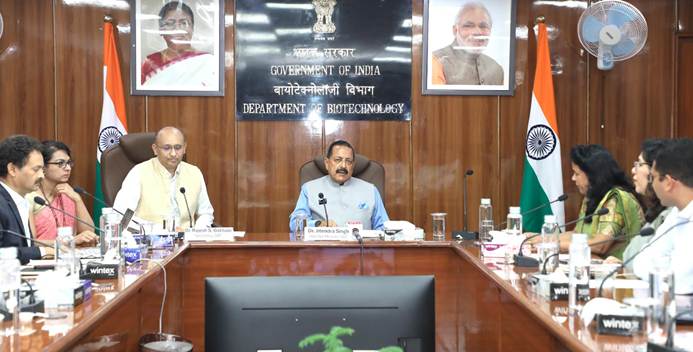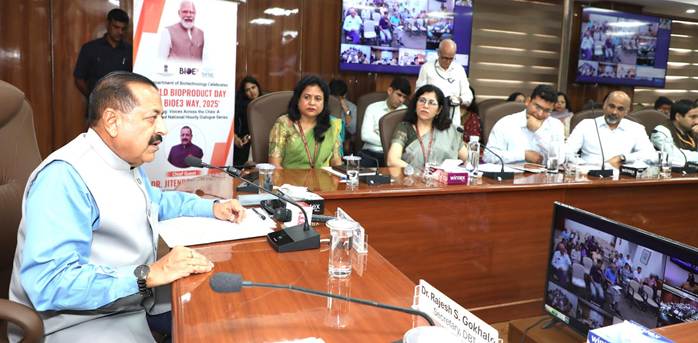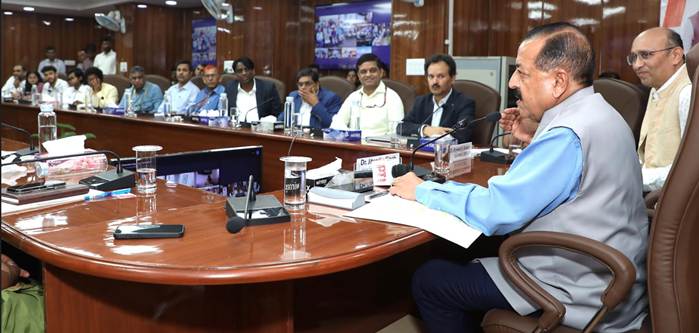Ministry of Science & Technology
India Targets $300 Billion Bioeconomy by 2030: Dr. Jitendra Singh Unveils Vision at World Bioproduct Day
Biotech for Every Indian: The Minister Urges Citizens to See Themselves as Stakeholders in Bioeconomy
‘Voices Across the Cities’ Marks a First: Nation-wide Hourly Dialogue Showcases India’s Biotech Diversity
प्रविष्टि तिथि:
07 JUL 2025 5:28PM by PIB Delhi
Union Minister of Science & Technology, Dr. Jitendra Singh today called for a wider public understanding and inclusive participation in India’s biotechnology mission, stating that every Indian is a stakeholder in the country’s bioeconomy. Speaking here during the nationwide celebration of World Bioproduct Day – The BioE3 Way, the Minister reiterated the government’s commitment to realizing a $300 billion bioeconomy by 2030.
The event, organized by the Department of Biotechnology (DBT) and its agencies BIRAC and iBRIC+, marked a novel national experiment — ‘Voices Across the Cities: A Synchronized National Hourly Dialogue Series’. Over eight hours, select institutions across Indian cities hosted theme-based discussions on marine biomass, industrial valorisation, forest resources, and agri-residue innovations, reflecting the regional diversity of India’s bioproduct capabilities.

Calling the format a “beautiful hybrid model,” Dr. Jitendra Singh praised the decentralized and inclusive outreach. “This is more than a science event. It’s an outreach movement,” he said, adding that involving students, startups and industry leaders was essential to make the mission sustainable. “It is easy to start a startup. What’s difficult is to keep it started,” he said, underlining the need for early industry partnerships and financial support for biotech ventures.
The Minister highlighted that India’s biotechnology ecosystem has grown from just around 50 startups a decade ago to nearly 11,000 today — a leap made possible by policy backing and institutional partnerships. Referring to the recently launched BioE3 Policy, Dr. Jitendra Singh noted that it lays the groundwork for India to lead in sustainable biomanufacturing by aligning bioeconomy goals with environmental sustainability, economic growth, and equity.

“Bioproducts aren’t limited to laboratories anymore. They’re about livelihoods — from biodegradable packaging to eco-friendly personal care, from rural employment to green jobs,” he said. He also emphasized that the future industrial revolution will be driven by bioeconomy, and India, he believes, has taken the lead.
The Minister acknowledged the challenges faced by young scholars in biotech, pointing out the mismatch between parental expectations and individual aptitude in career choices. He termed the National Education Policy (NEP) 2020 a “game-changer” that would allow students to pursue disciplines of interest with flexibility. “We are seeing a new generation with real aptitude and capacity to learn,” he said.
Dr. Jitendra Singh also drew attention to the disparity in India’s past policy priorities, especially in agriculture, which he said was historically informed by western models. Stressing the untapped potential of India’s natural resources and traditional knowledge systems, he said, “Foreign researchers come to India for what they don’t have — our resources and diversity. We should learn to value them first.”

In his address, Secretary, DBT and Chairman of BIRAC, Dr. Rajesh S. Gokhale outlined steps being taken to operationalise the BioE3 Policy. These include support for pilot manufacturing, region-specific innovation missions, and strengthening the pipeline from research to market. He underscored DBT’s role in catalyzing collaborations among academia, startups, and industries for scalable biotech solutions.
The Minister also urged for stronger social media outreach, using success stories, local languages, and relatable formats to communicate biotech’s relevance to common citizens. “If we want to attract young talent, we must link biotechnology to profitability and livelihood, not just academics,” he said.
The day-long event also served as a reminder of biotechnology’s reach beyond urban laboratories — into farms, oceans, forests, and industries. Dr. Jitendra Singh proposed future editions of the programme include voices from farmers, fishermen, and non-scientist stakeholders. “Let them tell us what they need from science and what science needs to deliver for them,” he said.
As India positions itself for a greener, innovation-driven economy, today’s event reflected a shift in how science communication, policy, and public participation intersect. And at the heart of it lies a broader message: biotechnology is not just for scientists — it’s for everyone.
****
NKR/PSM
(रिलीज़ आईडी: 2142921)
आगंतुक पटल : 555